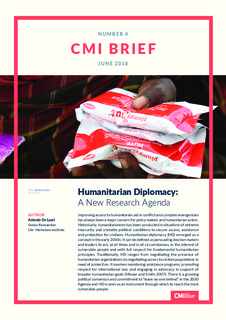Humanitarian Diplomacy: A New Research Agenda
Original version
Bergen: Chr. Michelsen Institute (CMI Brief no. 2018:4) 4 p.Abstract
Improving access to humanitarian aid in conflict and complex emergencies has always been a major concern for policy makers and humanitarian actors. Historically, humanitarianism has been conducted in situations of extreme insecurity and unstable political conditions to secure access, assistance and protection for civilians. Humanitarian diplomacy (HD) emerged as a concept in the early 2000s. It can be defined as persuading decision makers and leaders to act, at all times and in all circumstances, in the interest of vulnerable people and with full respect for fundamental humanitarian principles. Traditionally, HD ranges from negotiating the presence of humanitarian organizations to negotiating access to civilian populations in need of protection. It involves monitoring assistance programs, promoting respect for international law, and engaging in advocacy in support of broader humanitarian goals (Minear and Smith 2007). There is a growing political consensus and commitment to “leave no one behind” in the 2030 Agenda and HD is seen as an instrument through which to reach the most vulnerable people.
This brief discusses how the concept of HD is key to understanding critical changes in the humanitarian field and how humanitarian efforts, foreign policy and strategic interests increasingly overlap in the contemporary scenario.
